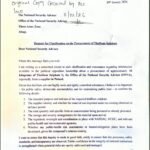By Prudence Arobani
Victims of the UN building bombings in Baghdad, Abuja and others cities around the world have been remembered by the United Nations to commemorate the 2018 World Humanitarian Day.
Remembering 22 colleagues killed by the “horrific terrorist attack” on the UN headquarters in Baghdad 15 years ago, Secretary-General António Guterres called on all staff to pay tribute to the fallen by “continuing their mission,” and going to “dangerous places with the aim of making them safer”.
In a wreath-laying ceremony at the UN headquarters in New York, Guterres reminded the people of the UN core commitment to stand “with those who are suffering, to bring them the relief they need”.
The UN chief said the attack, which was the first time the UN was deliberately targeted on a massive scale, “was traumatising for the whole organisation, and we learned some very difficult lessons”.
“Before and since that day, United Nations staff have been targeted by those who would like to weaken us and make us afraid to do our jobs. From Algiers to Kabul to Mogadishu, Abuja and beyond, terrorists have attempted to silence and to banish us,” Guterres said.
The Abuja UN building was attacked with a car bomb on Aug. 26, 2011. Twenty one people were killed and 60 wounded. Boko Haram claimed responsibility.
The car broke through two security barriers, and its driver detonated the bomb after crashing it into the reception area, causing devastation to the building’s lower floors.
Then Minister of State for Foreign Affairs, Prof. Viola Onwuliri, said: “This is not an attack on Nigeria but on the global community. An attack on the world”, while then UN Secretary-General Ban Ki-moon described the attack as an “assault on those who devote themselves to helping others”.
In September 2011, the Nigerian Department of State Security alleged that Mamman Nur was the mastermind behind the attack and offered a 26 million naira bounty, while four men appeared in an Abuja magistrates’ court charged with organising the bombing.
After observing a minute’s silence, Guterres said the fallen UN staff had “made the ultimate sacrifice for the values and the Charter of the UN.
Addressing the audience, which included families and colleagues of the deceased, he said “this was a huge personal loss to so many of us. And an even greater blow to the families of those who were killed”.
However, Guterres regretted that “the mechanisms in place to look after survivors and the families of victims were inadequate, and it has taken too many years to improve them”.
While restating that the work of the UN “will never be free from risk,” the Secretary-General stressed that he was “committed to improving security for all United Nations staff”.
“The blue flag of the United Nations flies high because of the brave women and men who carry it to the farthest corners of the world,” he said, adding that “the legacy of the humanitarian workers, the peacekeepers, the military and civilian staff who have given their lives is lasting and will be ever-present in our hearts”.
The Nigerian Ambassador/Deputy Permanent Representative, Amb. Samson Itegboje, represented Nigeria at the event, while some victims of the bombings from Nigeria and other countries, some of whom preferred their identities to be protected, were present at the event.
Itegboje, who regretted the unfortunate bombing, however, noted that Boko Haram terrorists had been driven out of Nigeria’s territory since 2015 when the administration of President Muhammadu Buhari came on board, and were now restricted to carrying out suicide bombings on unsuspecting citizens.
The Nigerian envoy said credit must be given to Buhari for providing leadership in ensuring that the terrorist group, which hitherto held territories and hoisted flags in many local government areas across three Northeast States, and frequently attacked cities including Abuja, had been largely decimated. (NAN)
APT/








